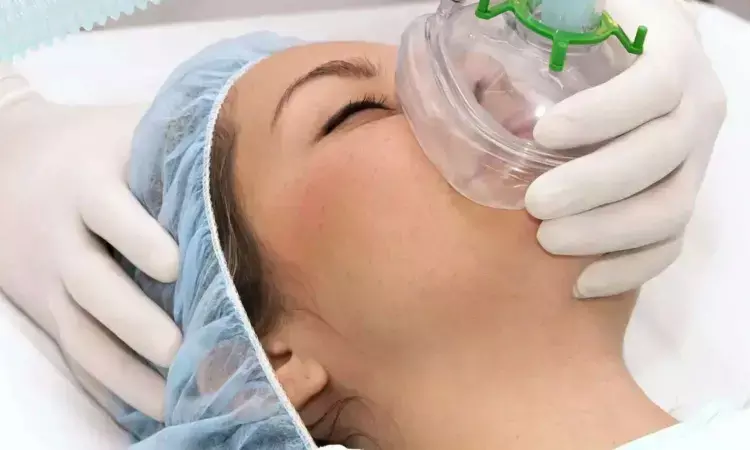- Home
- Medical news & Guidelines
- Anesthesiology
- Cardiology and CTVS
- Critical Care
- Dentistry
- Dermatology
- Diabetes and Endocrinology
- ENT
- Gastroenterology
- Medicine
- Nephrology
- Neurology
- Obstretics-Gynaecology
- Oncology
- Ophthalmology
- Orthopaedics
- Pediatrics-Neonatology
- Psychiatry
- Pulmonology
- Radiology
- Surgery
- Urology
- Laboratory Medicine
- Diet
- Nursing
- Paramedical
- Physiotherapy
- Health news
- Fact Check
- Bone Health Fact Check
- Brain Health Fact Check
- Cancer Related Fact Check
- Child Care Fact Check
- Dental and oral health fact check
- Diabetes and metabolic health fact check
- Diet and Nutrition Fact Check
- Eye and ENT Care Fact Check
- Fitness fact check
- Gut health fact check
- Heart health fact check
- Kidney health fact check
- Medical education fact check
- Men's health fact check
- Respiratory fact check
- Skin and hair care fact check
- Vaccine and Immunization fact check
- Women's health fact check
- AYUSH
- State News
- Andaman and Nicobar Islands
- Andhra Pradesh
- Arunachal Pradesh
- Assam
- Bihar
- Chandigarh
- Chattisgarh
- Dadra and Nagar Haveli
- Daman and Diu
- Delhi
- Goa
- Gujarat
- Haryana
- Himachal Pradesh
- Jammu & Kashmir
- Jharkhand
- Karnataka
- Kerala
- Ladakh
- Lakshadweep
- Madhya Pradesh
- Maharashtra
- Manipur
- Meghalaya
- Mizoram
- Nagaland
- Odisha
- Puducherry
- Punjab
- Rajasthan
- Sikkim
- Tamil Nadu
- Telangana
- Tripura
- Uttar Pradesh
- Uttrakhand
- West Bengal
- Medical Education
- Industry
Low-dose ketamine effective in reducing the incidence of shivering following spinal anesthesia

Low-dose ketamine was effective in reducing the incidence of shivering following spinal anaesthesia compared to tramadol suggests a recent study published in the BMC Anesthesiology
Post-spinal shivering is a common complication after spinal anesthesia with a high incidence among orthopedic patients. Untreated shivering may predispose to exacerbation of wound pain, increased metabolic demand, oxygen consumption, and hemostatic dysfunction. Various studies have been done on the effectiveness of preventing post-spinal shivering using ketamine and other drugs. However, little information on better prophylactic agents in terms of effectiveness and availability. Therefore, this study was intended to compare 0.25 mg/kg of Ketamine (K) versus 0.5 mg/kg of Tramadol (T) for the prevention of post-spinal shivering.
The overall incidence of post-spinal shivering was 187 (36.2%), of which it was 74 (28.7%) on ketamine and 113 (43.8%) on tramadol with a p-value of 0.001.
The incidence of nausea and vomiting was 157 (60.9%) on tramadol and 8 (3.1%) on ketamine, with a p-value of 0.001.
Patients aged 18-35 years, 36-55 years, and those patients with a prolonged duration of surgery were more likely to experience post-spinal shivering.
And Low-dose ketamine has a protective effect against developing post-spinal shivering with an AOR of 0.427
Low-dose ketamine is more effective in reducing the incidence and severity of shivering after spinal anesthesia. Therefore, we recommend using low-dose ketamine to be effective as a prophylactic for post-spinal shivering in those patients undergoing orthopedic surgery under spinal anesthesia.
Reference:
Gemechu AD, Gebremedhin TD, Andebiku AA, Solomon F, Sorsa A. The effect of ketamine versus tramadol on prophylactic post-spinal shivering in those patients undergoing orthopedic surgery: a prospective cohort study design, 2020. BMC Anesthesiol. 2022 Nov 24;22(1):361. doi: 10.1186/s12871-022-01906-z. PMID: 36424561.
Keywords:
Low-dose ketamine, effective,reducing the incidence of shivering following spinal anesthesia compared to tramadol, Gemechu AD, Gebremedhin TD, Andebiku AA, Solomon F, Sorsa A, BMC Anesthesiology, Ketamine; Orthopedic surgery; Post-spinal shivering; Spinal anaesthesia; Tramadol.
Dr. Shravani Dali has completed her BDS from Pravara institute of medical sciences, loni. Following which she extensively worked in the healthcare sector for 2+ years. She has been actively involved in writing blogs in field of health and wellness. Currently she is pursuing her Masters of public health-health administration from Tata institute of social sciences. She can be contacted at editorial@medicaldialogues.in.
Dr Kamal Kant Kohli-MBBS, DTCD- a chest specialist with more than 30 years of practice and a flair for writing clinical articles, Dr Kamal Kant Kohli joined Medical Dialogues as a Chief Editor of Medical News. Besides writing articles, as an editor, he proofreads and verifies all the medical content published on Medical Dialogues including those coming from journals, studies,medical conferences,guidelines etc. Email: drkohli@medicaldialogues.in. Contact no. 011-43720751


